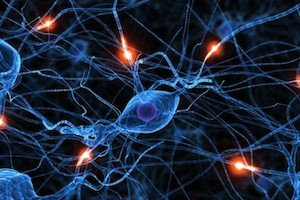
To learn about Alzheimer’s research in San Diego County, click here or contact Alzheimer’s San Diego at 858.492.4400.
1) Role of Seizures in Alzheimer’s Disease
Scientists are now looking closely at the role of seizures in Alzheimer’s disease. Research from Scientific American found that most patients previously observed were in the later stages of the disease. However, scientists are noticing changes in electrical signaling in the brains of patients earlier in the disease. A study from the University of California at San Francisco looked at 55 patients between the ages of 50 and 69 who were admitted to an Israeli medical center with their first-known seizure. A quarter of them developed dementia with a mean time to the diagnosis of eight and a half years. Another study of nearly 300,000 U.S. veterans over the age of 55 found that seizures were associated with twice the risk for developing dementia between one and nine years later. Two additional studies found that people with Alzheimer’s had more seizures than normal controls. However, one of those studies, which is also unpublished, looked for evidence of seizures before a diagnosis of Alzheimer’s and failed to find such an association. Patients with these so-called partial seizures might stop and stare, or experience psychic phenomena like deja vu. Seizures that can be detected on EEG during an overnight testing session are often missed during standard daytime tests that may be as short as 20 minutes.
2) Activating the Immune system
Bay Area-based company Alector is working on energizing immune system cells to clear out toxic proteins. The company raised $133 million for the project and unveiled the first three antibodies that will be tested in clinical trials. The method builds on promising results in testing immunotherapies for cancer treatment.
It will test these three antibodies:
- AL001 will be tested for Fronto-Temporal Dementia, designed to increase therapeutic levels of progranulin (PGRN). PGRN sustains neuron survival and moderates potentially harmful inflammatory responses of certain immune system cells. The intended result: higher available PGRN levels, will protect neurons from injury, and reduce the inflammation that threatens brain health.
- AL002 will be tested for Alzheimer’s, designed to restore function to faulty versions of a watchdog receptor that detects dangerous molecular trash and triggers the microglia to get rid of it.
- AL003 will also be tested for Alzheimer’s—it will bind to a cell surface receptor on microglia which may help to inhibit the ability of the microglia to dispose of the accumulated garbage that can damage the brain.
Read the full story at Xconomy and from Alector’s press release.
3) FDA Sends Warning Letters to CBD Companies
The Federal Trade Commission joined the U.S. Food and Drug Administration (FDA) in sending warning letters to three companies marketing products containing cannabidiol to treat and cure a variety of serious diseases and conditions. Nutra Pure LLC, PotNetwork Holdings, Inc., and Advanced Spine and Pain, LLC (d/b/a Relievus) advertise a range of supplements that claim to contain cannabidiol, or CBD, such as “Hemp Oil,” “CBD Softgels,” “Liquid Gold Gummies,” and “CBD Oil.” These products claim to effectively treat diseases, including cancer, Alzheimer’s disease, fibromyalgia, and “neuropsychiatric disorders, has anti-emetic, anti-convulsive, anti-inflammatory and analgesic properties.
Read other FDA warning letters for products claiming to treat Alzheimer’s.
4) Brain Health vs. Supplements
The Global Council on Brain Health reviewed scientific literature that suggests a healthy diet is much better than dietary supplements. AARP surveyed Americans 50 and older and found more adults took supplements to reverse dementia than there were people diagnosed with the disease. The supplement market is more aggressively marketing to the older adult population, using vague claims because these claims aren’t actually validated by scientific research. GCBH examined the evidence available about vitamins and minerals focusing on the eight B vitamins, vitamin D and vitamin E. They also looked at fish oil, coconut oil, caffeine, flavanols and several other supplements marketed to improve brain health. These products are not regulated by the Food and Drug Administration like prescription medications are, and there are no universal standards for their production. Therefore, GCBH does not recommend using supplements that claim to improve brain health and function. The report states that sales of supplements claiming to boost memory have nearly doubled from 2006 to 2015. In 2016, sales of brain health supplements totaled $3 billion. That’s projected to increase to $5.8 billion by 2023.
Read more from Healthline.
5) Brain Cells and Sleep
In a study published in Alzheimer’s and Dementia, researchers found that Alzheimer’s disease annihilates a network of brain cells that keep us awake. In the brains of 20 deceased people, seven healthy and 13 with Alzheimer’s, the team studied levels of tau protein and counted neurons in three brain regions which help us stay awake. Researchers found tau had collected in these three regions in those with Alzheimer’s and that 75 percent of neurons had diminished. This wasn’t the case in different types of dementia, suggesting Alzheimer’s Disease is unique in this regard. Past studies suggested that fragmented sleep was caused by mechanical problems leading to sleep apnea. This, in turn, was thought to cause a build-up of amyloid, affecting brain waves and causing more sleep problems. It was thought daytime sleepiness compensated for the lack of sleep. “The study supports the idea that sleep dysfunction is a manifestation of Alzheimer’s pathology buildup in the brain, rather than a risk factor. It opens opportunities to treat the cause rather than the symptoms”
Read the full story from Newsweek.
Registries:
- Cleveland Clinic Healthy Brains Registry (nationwide)—take an online brain health assessment and learn about brain health studies.
- Alzheimer’s Prevention Registry (nationwide)—get information and updates about participating in future Alzheimer’s prevention trials.
- GeneMatch (nationwide)—enroll to get matched to Alzheimer’s genetics studies.
- Brain Health Registry (nationwide)—sign up for an online study of brain health and learn about possible research-study opportunities.
- Alzheimer Prevention Trials (APT) Webstudy (nationwide)—enroll to track memory and thinking skills and learn about Alzheimer’s trials





